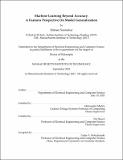Machine Learning Beyond Accuracy: A Features Perspective On Model Generalization
Author(s)
Santurkar, Shibani
DownloadThesis PDF (69.24Mb)
Advisor
Madry, Aleksander
Shavit, Nir
Terms of use
Metadata
Show full item recordAbstract
Prompted by its performance on a variety of benchmark tasks, machine learning (ML) is now being applied to tackle real-world problems. Yet, there is growing evidence that benchmark performance does not convey the full picture. Existing ML models turn out to be remarkably brittle: a striking example of which is their susceptibility to imperceptible input perturbations known as adversarial examples.
In the first part of this thesis, we revisit adversarial examples, to use them as a window into current models. Our investigation provides a new perspective on why this susceptibility arises: it is a direct consequence of models’ reliance on predictive, yet brittle input features. In fact, our findings demonstrate that adversarial examples are a manifestation of a deeper problem: the mechanisms by which current models succeed on benchmarks are fundamentally misaligned with what humans tend to envision. This prompts the question:
How can we build ML models that generalize not only on the benchmarks used for their development but also to the real world?
To answer this question, we examine the ML pipeline from a “features perspective”: focusing not only on what label models predict, but also on what features they use to do so. To this end, in the second part of this thesis, we develop a suite of tools to get a better grasp on: (i) what features models learn, (ii) why they learn them, and (iii) how one can modify the learned features at train or test time. These tools enable us to gain new insights into crucial design choices made during model development, such as how we create datasets, and train and evaluate models. Equipped with these insights, we then propose concrete refinements to the ML pipeline to improve model generalization in the aforementioned broader sense.
Date issued
2021-09Department
Massachusetts Institute of Technology. Department of Electrical Engineering and Computer SciencePublisher
Massachusetts Institute of Technology